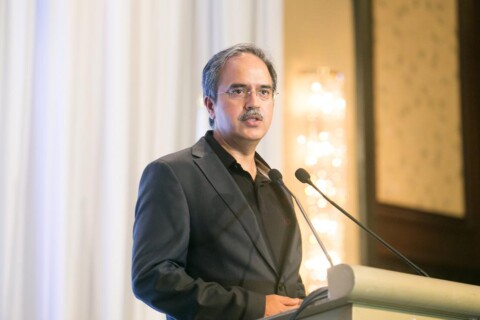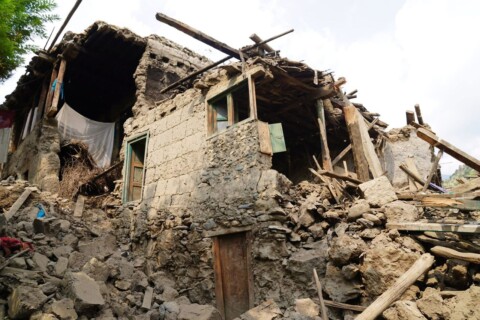On 1 October 2024, Gulsom, 7 years old, washes her hands at a new water tap at her home in Sadullah village, Charikar district, Parwan Province, Afghanistan. Gulsom is in 1st grade at school. Her favorite subject is mathematics and she wants to be a teacher in the future. Gulsom said: “When the water taps were not installed, we used to go and fill our water bottles and fetch water from the stream. The stream water was not clean so we got sick.” As a result of this water project, 277 families, including 388 girls, 386 boys, 677 women, and 485 men, along with Sadullah Payen School—serving nearly 1,300 students—now benefit from the water supply network. The project includes a 120-meter borewell with a discharge rate of 3 liters per second, a 40-cubic-meter elevated RCC water tank, a solar system, a boundary wall for the solar panel, and a transmission and distribution pipeline, serving 191 households with a service tap point and water meter. To ensure proper operation and maintenance, an Operation and Maintenance committee (O&M) was established, consisting of 10 community members and a mechanic. They were provided with the necessary tools for operation and maintenance, playing a crucial role in keeping the system functional. Orientation was provided to the O&M and the mechanic, familiarizing them with the critical parts of the water supply network and operation & maintenance tools. The O&M oversees the operation and maintenance of the water supply network. Water tariffs have been set by the O&M and the community at 15 AFs (approx. $0,2) per cubic meter, with payments based on the quantity of water consumed by families. Access to safe drinking water in Afghanistan is a significant challenge. Estimates suggest that only about 40% of the population has reliable access to safe drinking water, with rural areas facing greater difficulties compared to urban centers. Factors such as conflict, inadequate infrastructure, and climate change impact the availability
تاجالدین اویواله، نمایندهی صندوق حمایت از کودکان سازمان ملل متحد (یونیسف) در افغانستان، میگوید که کودکان افغان، به ویژه دختران، به دلیل کمبود آب و خدمات بهداشتی از رفتن به مکتب باز میمانند.
نمایندهی صندوق حمایت از کودکان سازمان ملل روز دوشنبه، ۲۱ جولای، در پیامی در شبکهی اجتماعی اکس نوشته است که نُه مکتب در ولایت لوگر به آب سالم و خدمات بهداشتی مجهز شدهاند. به گفتهی او، بیش از ۲ هزار و ۳۰۰ دانشآموز از این خدمات بهرهمند میشوند.
یونیسف پیشتر نیز هشدار داده بود که تا سال ۲۰۳۰، منابع آب در بیشتر ولایتهای افغانستان، به ویژه کابل، به طور کامل خشک خواهد شد. گفتنی است که بیشتر کودکان در مکاتب افغانستان به آب سالم دسترسی ندارند.
در سالهای اخیر، نهادهای بینالمللی بارها دربارهی وضعیت وخیم بهداشتی و کمبود منابع آب در مکاتب افغانستان هشدار دادهاند. این وضعیت به ویژه در مناطق دورافتاده، روند آموزش را با دشواریهای فراوان روبهرو کرده است. کمبود آب نه تنها سلامتی شاگردان را تهدید میکند؛ بلکه حضور منظم آنها در مکاتب را نیز تحت تأثیر قرار میدهد.






